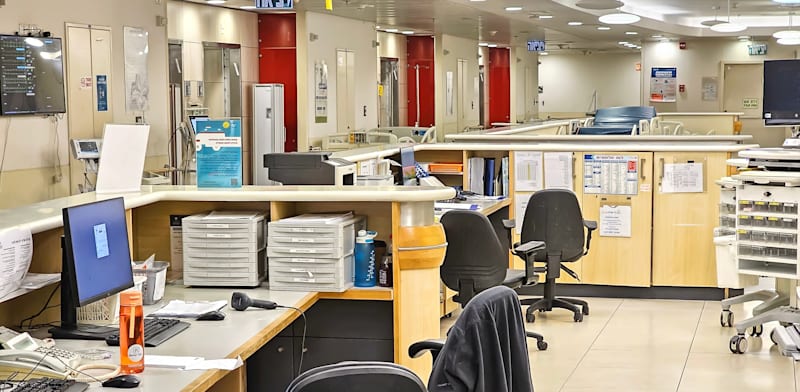If in a few years you will have great difficulty finding a doctor’s appointment, or you will hear about more people who had to undergo surgery abroad because there is no doctor in Israel in the specialty they need, know that these trends were predictable. Several factors combine to create a shortage of doctors in the Israeli health system, and one of them is The growing tendency of doctors not to return from studies or internships abroad.
The headlines about the wave of doctors leaving have been coming and going for years, with the discourse mainly dealing with their working conditions, the long shifts, the paucity of standards per capita and the low wages compared to other OECD countries. Some of these conditions have improved, but in the last two years, the doctors who are leaving emphasize issues external to their work, such as the legal reform and the security and economic situation.
Leaving doctors is always a burning issue because of the (relative) ease with which they can carry out this threat. The demand for Israeli doctors is high, and in any case ambitious doctors are required to go abroad for internships. When the country is difficult, these forays tend to be longer.
Another group of those who leave are medical students who go to study abroad. In recent years, efforts have been made to increase the number of medical faculties in Israel, and at the same time, the number of institutions abroad recognized by the state for medical studies has been limited, in order to maintain the quality. But even after these changes, Israel needs hundreds of doctors a year who will return from studying abroad to meet its medical manpower plans.
They talk less about Zionism
But it seems that the students are less willing to return. Moshe Cohen, CEO of the Medical Doctor company, which prepares students for the entrance exams to medical schools abroad and supports them during their studies, says that “in the past, for every 250 of my students who traveled each year, 220 would return. The rest did not return mainly because they did not graduate the degree for various reasons. Today they return between 180 and 150. I was surprised to hear the students say very easily that they don’t To return, we have not heard such things before.”
Medical Doctor periodically conducts surveys that show students’ attitudes regarding returning to Israel. A survey conducted last week shows a rapid deterioration compared to the previous survey conducted in May 2024. About 60% of students are seriously considering a career in Europe or the US after graduation. 27.7% do not rule it out and only 12.6% estimate that they will return to Israel, compared to 14.7% in May.
The survey was conducted in preparation for a conference on medical studies abroad that will be held on Friday, in which Medical Doctor invited a delegation from Europe that includes deans of medical schools and ambassadors. These will meet with Israeli ministers and members of the Knesset along with the mayor of Eilat Eli Lankri, as part of Cohen’s initiative to establish a private school International for medicine in the city.
When the students were asked what could bring them back to Israel, 76.7% said family. There are still 20% who talk about Zionism, but this rate is lower than in May 2024, when it was 23.4%. The desire to stay abroad exists even though 25.7% of the students experienced an anti-Semitic or anti-Israel incident, and 53.3% heard of other students who experienced such an incident.
The licensing test is frustrating
As for considerations against returning to Israel, there has been a significant change: today 43.3% speak of the economic consideration, compared to 38.9% in the May survey. Two other leading considerations are long shifts (25.7%) and the need to take an additional licensing test (18.3%).
These days, the Ministry of Health and the Israel Medical Association (RA) are considering exempting students who received an American license or one from some European countries from an additional licensing test, in order to facilitate their return to Israel. 70% of the students claim in the survey that the cancellation of the additional test will encourage them to return to Israel.
When the students were asked to what extent the legal reform affects the chance of returning to Israel, 60% answered that it affects to a large extent (37% to a very large extent and 23% to a large extent). 18% said that it affects to a moderate extent and 22% to a small extent. These figures are also a worsening compared to 2024 (54% to a very large or large extent, 20% moderately, 25% incorrect).
Cohen supports the plan presented by the Ministry of Health and the RA to return students to Israel already after the fifth year of studies, so that they will undergo part of the clinical training here. . Now, when we reached a crisis in terms of the number of future doctors, it turned out that it was possible to expand the clinical fields.”
For your attention: The Globes system strives for a diverse, relevant and respectful discourse in accordance with the code of ethics that appears in the trust report according to which we operate. Expressions of violence, racism, incitement or any other inappropriate discourse are filtered out automatically and will not be published on the site.
